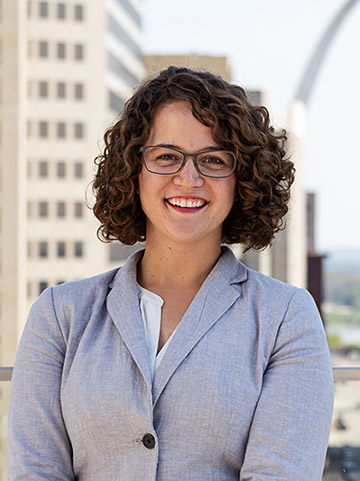Third-Year Law Student Wins First Place in Health Law Writing Competition
Third-year law student Megan Hart was recently announced the first-place winner of the 2020 Epstein Becker Green Health Law Writing Competition. A $4,000 prize accompanies the honor.
Hart’s paper, “Expanding Access to Breast Cancer Genetic Testing Through Incentive Regimes,” will be published in the Saint Louis University Journal of Health Law & Policy in the spring. Prof. Ana Santos Rutschman served as her advisor for the paper.
“This is an extremely prestigious and competitive writing award,” Santos Rutschman said. “I’m very proud of Megan for her work and for this achievement.”

In the paper, Hart describes the benefits of gene editing technology in detecting genetic variants that are risk factors for developing breast cancer. She then explores the roadblocks that limit the accessibility of this technology, namely, the lack of a uniform FDA regulatory pathway as well as intellectual property barriers.
“My proposal is that we need a single regulatory pathway for all genetic tests,” Hart said. “There are different types of genetic tests that require different levels of regulatory clearance and different types of clinical testing data. Companies are not incentivized to pursue these types of commercial products because there is not a singular regulatory pathway, and therefore, they don’t understand the regulatory and clinical testing requirements necessary to market these products.
“From a legal perspective, the Supreme Court has held that genes and genetic tests are not eligible for patent protection, but companies can still make use of trade secrecy laws to protect genetic testing data as proprietary," Hart continued. "Today, a single company holds the proprietary rights to once-patented sequences of the BRCA [BReast CAncer] genes, and this allows the company to monopolize genetic testing of these genes and the resulting testing data. However, this data is not publicly available. The uniform regulatory pathway that I’m proposing would require the FDA to make the data publicly available. The FDA has the infrastructure and capability to bring that kind of public data into the medical field.”
Hart says there is an advocacy pathway forward to achieve these ends and that pressure from the science and medical fields on the FDA could help bring it about. Doing so has the potential to save countless lives and open new avenues for the advancement of cancer research.
“I have a history of breast cancer in my family: my grandmother died from breast cancer when she was younger, and my mother is a breast cancer survivor. I myself am a high-risk individual,” Hart said. “I’m really passionate about this area of research, and yet I know there are ways we can improve our genetic testing approach.
"I’m very supportive of IP rights; I think that they’re a value-add for our society," she continued. "Although not everyone shares that view, I wanted this to be a paper that both sides of the argument would read. There are issues, and we all have to come together and figure out how we can make our approach better.”
“Megan’s contribution in this article is important, as it calls attention to the problems of an intellectual property-encumbered culture,” Santos Rutschman said. “Intellectual property incentives are necessary for innovation, but too many rights can make critical health products too expensive or otherwise inaccessible to the patients who sometimes need them the most. Megan captured this tension perfectly in her work, and proposed an interesting solution to the problem.”
Hart, who is a biomedical engineer and spent six years in that field after graduating from Purdue University, passed the patent bar last summer. She has already landed a post-graduation job working in intellectual property law.
“The intersection of intellectual property and health law is such a niche; that is where my interest is,” she said. “I expected to come out of law school wanting to do the ethics and policy side of health law. I didn’t think that there was a space for me as an engineer; patent law had not ever crossed my mind.
“Meeting the faculty at SLU LAW and hearing them talk about their passions, all while encouraging me in my unique interest – it has been an amazing support system and helped me find the place I really want to be,” she continued. “SLU LAW has been one of the best decisions of my life.”